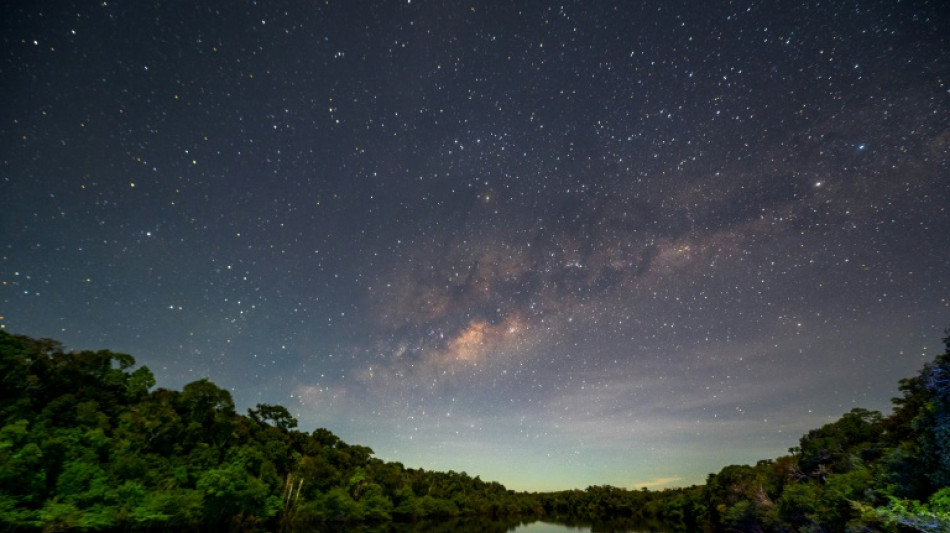
-
 UK police hold ex-prince Andrew for hours in unprecedented blow
UK police hold ex-prince Andrew for hours in unprecedented blow
-
Former Olympic freeski halfpipe champion Sharpe crashes heavily

-
 Former Olympic champion Sharpe suffers heavy halfpipe crash
Former Olympic champion Sharpe suffers heavy halfpipe crash
-
Belarus says US failed to issue visas for 'Board of Peace' meeting

-
 Forest boss Pereira makes perfect start with Fenerbahce rout in Europa play-offs
Forest boss Pereira makes perfect start with Fenerbahce rout in Europa play-offs
-
Alcaraz fights back to book last four berth in Qatar

-
 England captain Itoje warns of 'corrosive' social media after abuse of Ireland's Edogbo
England captain Itoje warns of 'corrosive' social media after abuse of Ireland's Edogbo
-
War-weary Sudanese celebrate as Ramadan returns to Khartoum

-
 Townsend expects recalled Scotland duo to shine in Six Nations clash with Wales
Townsend expects recalled Scotland duo to shine in Six Nations clash with Wales
-
Peru's new president under fire for child sex comments
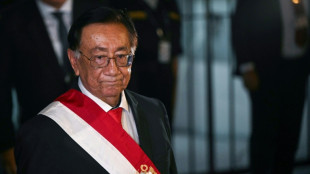
-
 UK king opens London fashion week despite brother's arrest
UK king opens London fashion week despite brother's arrest
-
Belarus frees opposition politician Statkevich

-
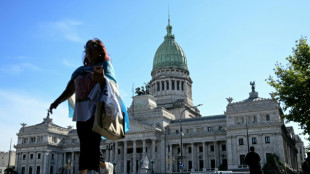 Striking Argentine workers slow down Buenos Aires in protest over labor reforms
Striking Argentine workers slow down Buenos Aires in protest over labor reforms
-
Starlink loss a blow to Russian forces in Ukraine: experts
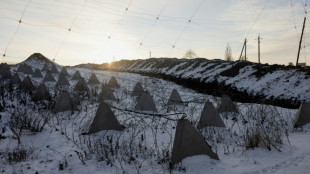
-
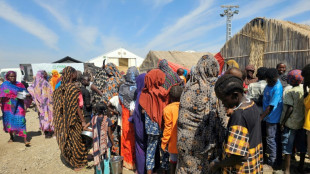 UN's Sudan probe finds 'hallmarks of genocide' in El-Fasher
UN's Sudan probe finds 'hallmarks of genocide' in El-Fasher
-
Belarus frees opposition politician Statkevich: wife

-
 Rocket re-entry pollution measured in atmosphere for first time
Rocket re-entry pollution measured in atmosphere for first time
-
Airbus ready to build two new European fighters if countries want

-
 Canada makes push to attract skilled migrants, including for defence
Canada makes push to attract skilled migrants, including for defence
-
US threatens to leave IEA if net zero focus remains
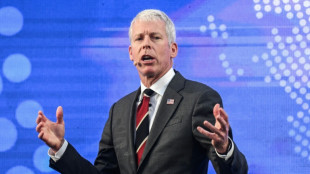
-
 Walmart outlines big AI ambitions as it reports mixed results
Walmart outlines big AI ambitions as it reports mixed results
-
Trump kicks off his 'Board of Peace,' as war clouds loom on Iran
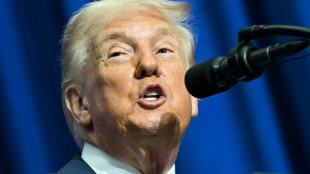
-
 UK pubs to stay open late if home nations reach World Cup knockouts
UK pubs to stay open late if home nations reach World Cup knockouts
-
TotalEnergies in high-stakes French trial over climate change

-
 Bosnia probes fascist salutes at Croatian singer's concert
Bosnia probes fascist salutes at Croatian singer's concert
-
US and Israel issue dire warnings to Iran alongside US military buildup

-
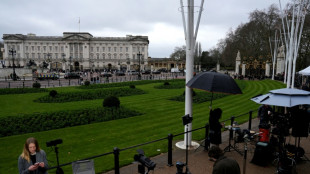 British public cheer Andrew's arrest with a smile and relief
British public cheer Andrew's arrest with a smile and relief
-
Argentine workers go on strike to protest Milei's labor reforms
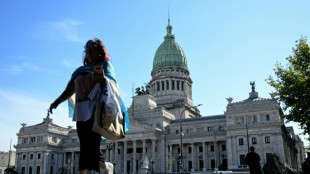
-
 Nakai targets Olympic skating upset as 'skimo' makes debut
Nakai targets Olympic skating upset as 'skimo' makes debut
-
What we know about ex-prince Andrew's friendship with Epstein

-
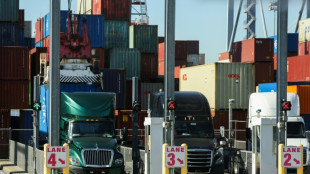 US trade deficit in goods widens to new record in 2025
US trade deficit in goods widens to new record in 2025
-
Oil extends gains on US-Iran tensions, stocks retreat

-
 Williams 'on the back foot' after missing Barcelona: Albon
Williams 'on the back foot' after missing Barcelona: Albon
-
Real Madrid submit evidence to UEFA in Vinicius racism probe

-
 Olympics rev up Milan's renewal but locals fear price to pay
Olympics rev up Milan's renewal but locals fear price to pay
-
Cardona Coll, Fatton win Olympic-debuting ski mountaineering sprint golds

-
 MSF will keep operating in Gaza 'as long as we can': mission head
MSF will keep operating in Gaza 'as long as we can': mission head
-
Russian Filippov wins first medal at Milan-Cortina Games for individual neutral athletes

-
 Italian Milan takes sprint honours at UAE Tour
Italian Milan takes sprint honours at UAE Tour
-
Dozens killed in jihadist attacks in northwest Nigeria

-
 Zimbabwe unbeaten in T20 World Cup after six-wicket Sri Lanka win
Zimbabwe unbeaten in T20 World Cup after six-wicket Sri Lanka win
-
Postecoglou admits taking Nottingham Forest post a 'bad decision'

-
 Switzerland's Fatton wins women's ski mountaineering sprint on Olympic debut
Switzerland's Fatton wins women's ski mountaineering sprint on Olympic debut
-
Kinghorn, Van der Merwe return for Scotland against Six Nations strugglers Wales

-
 Repsol says could boost Venezuela oil output over 50% in 12 months
Repsol says could boost Venezuela oil output over 50% in 12 months
-
UN says Israeli actions raise 'ethnic cleansing' fears in West Bank, Gaza

-
 Arteta tells faltering leaders Arsenal to harness Wolves 'pain' against Spurs
Arteta tells faltering leaders Arsenal to harness Wolves 'pain' against Spurs
-
Crowley gets nod for Irish as Prendergast drops out

-
 Unbeaten Swiss to meet Great Britain in Olympic men's curling semis
Unbeaten Swiss to meet Great Britain in Olympic men's curling semis
-
UK police arrest ex-prince Andrew on suspicion of misconduct


Race to find Brazil Amazon species before they disappear
In a remote part of the Brazilian Amazon, a scientific expedition is cataloguing species. Time is of the essence.
"The rate of destruction is faster than the rate of discovery," says botanist Francisco Farronay, of the National Institute of Amazonian Research (INPA), as he cuts into the bark of an enormous tree and smells its insides.
"It is a race against time."
The largest rainforest on Earth, still largely unexplored by science, is assailed by deforestation for farming, mining and illegal timber extraction.
According to a MapBiomas study last year, the Amazon lost some 74.6 million hectares of native vegetation -- an area equivalent to the entire territory of Chile -- between 1985 and 2020.
The destruction accelerated under the government of far-right President Jair Bolsonaro, accused by environmentalists of actively encouraging deforestation for economic gain.
The rainforest is considered vital to curbing climate change for its absorption of Earth-warming CO2.
Since 2019, when Bolsonaro took power, average annual deforestation in the Brazilian Amazon increased by 75 percent compared to the previous decade, according to official figures.
- 'Science denialism' -
"Most plant species in the Amazon are to be found in encroached areas," said Alberto Vicentini, another member of the expedition launched by Greenpeace.
It is estimated that "we do not know 60 percent of the tree species, and every time an area is deforested, it destroys a part of the biodiversity that we will never know," said the INPA scientist.
For their research in this remote part of the northern Brazilian state of Amazonas, the team of took a plane from Manaus, flying over hundreds of kilometers of green forest cut by meandering rivers, to Manicore.
From there, a five-hour boat trip by river for a weeks-long expedition to collect plant samples and observe animal behavior, for which they installed cameras and microphones.
The group includes experts in mammals, birds, amphibians, reptiles and fish, trees and flowers. But it is a tough time to be a scientist in Brazil, they say.
"We are living in a moment of science denialism, as we saw with the pandemic in Brazil," with Bolsonaro railing against masks and vaccines, said Vicentini.
"Research institutions in Brazil are under attack by the policies of this government, universities are suffering many cuts," he added.
A sheet of newspaper used by one of the botanists in the group to press a flower has the headline: "Increase in wood extraction in Amazonas" with a photo of two trucks leaving the rainforest loaded with logs.
"There are places where no one has ever been, we have no idea what is there," said INPA biologist Lucia Rapp Py-Daniel.
"Without the resources to investigate, we do not have the necessary information to even explain why we have to conserve" the area, she said.
Resources have been dwindling for a decade -- another phenomenon that has sped up under Bolsonaro, according to critics.
In May, Brazil’s two main scientific societies, the Brazilian Academy of Sciences (ABC) and the Brazilian Society for the Advancement of Science (SBPC) warned that funding for scientific research in the country would be cut by almost 3.0 billion reais (about $560 million) this year.
"We should accelerate the pace of research in the face of the destruction, but instead we are slowing down," says Py-Daniel.
G.Stevens--AMWN


